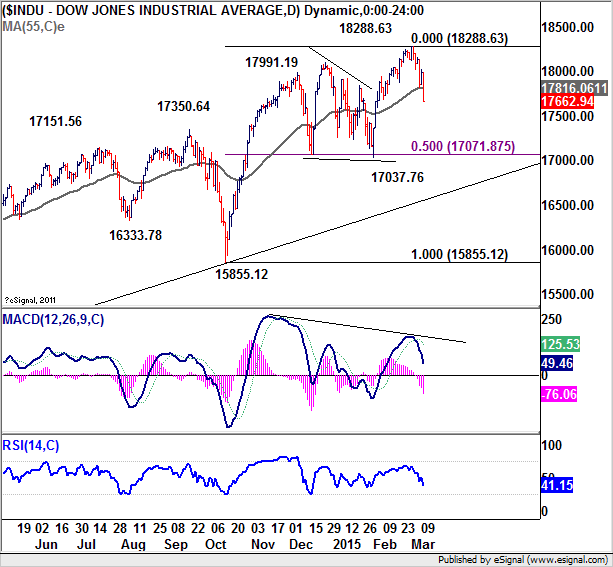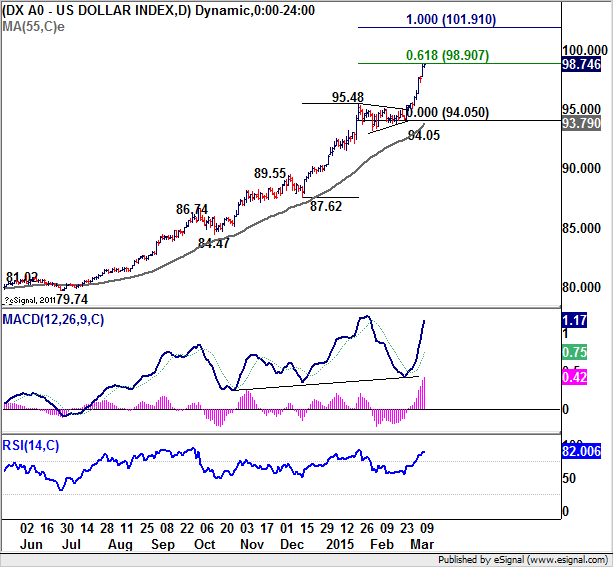Dollar extends recent rally while stocks tumbled sharply overnight as markets continued to build up expectations for Fed to drop the word "patient" in the FOMC meeting next week, after that March 17-18 meeting. While the move won't guarantee a rate hike in June, it would give Fed the option to start looking at the evolvement in economic data and start raising rate in the summer. DJIA dropped sharply by -332.78 pts, or -1.85% to close at 17662.94. S&P 500 also lost -35.27 pts, or -1.7% to close at 2044.16. Dollar index surged to as high as 98.80 so far. The greenback hesitated for a while as risk aversion triggered a retreat in USD/JPY. But dollar stayed firm and continues to make multi-year high against Euro and Aussie.
DJIA's strong break of 55 days EMA raised the chance of medium term topping at 18288.63, on bearish divergence condition in daily MACD. We'd likely see deeper pull back until some support is seen around 17037.76, which is close to 50% retracement of 15855.12 to 18288.63 at 17071.87. It's a bit early to gauge the size of the correction from 18288.63 and we'll assess it later. But it should be noted that fall from 18288.63 is viewed as a correction only and there is no change in the long term bullish outlook in DJIA. That is, the up trend from 2009 low of 6469.95 still looks healthy.

Near term outlook in dollar index stays bullish as recent up trend continues. Based on current momentum, the rally is possibly accelerating. Near term target of 61.8% projection of 87.62 to 95.48 from 94.05 at 98.90 should be taken out with ease. We'll start to be cautious on resistance above 100 psychological level. And that is close to 100% projection at 101.91, and long term fibonacci level of 61.8% retracement of 121.02 to 70.69 at 101.79.

In Eurozone, yields in many countries, including Germany, France, Ireland, Portugal, Italy and Spain, fell to record lows as ECB started government bond purchases this week. Meanwhile, officials from ECB, EC and IMF will return to Athens today but it's unsure whether the new Greek government would open up its account for inspection. Eurogroup head Jeroen Dijsselbloem said that "we can only start discussions when people are welcome in Athens -- if that remains an issue, the process won’t start and the clock continues to tick.”
In UK, BoE governor Mark Carney said yesterday that it would be "extremely foolish" for the country to use more monetary stimulus to fight the temporary plunge in inflation. He emphasized that the "impact of that extra stimulus" would happen "well after the oil price fall have move through the economy". And in that case, BoE would have added "unnecessary volatility". Another BoE official, Ian McCafferty also said that the central bank should look through temporary impact of falling oil price.
On the data front, Australia Westpac consumer confidence dropped -1.2% in March while home loans dropped -3.5% in January. Japan domestic CGPI rose 0.5% yoy in February and machine orders dropped -1.7% mom. UK production data will be a main focus today.
